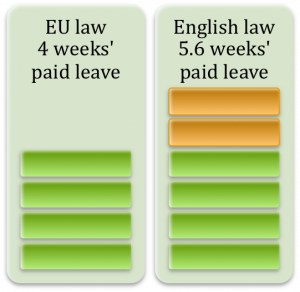Holiday pay must include overtime
Employees who regularly work overtime will be pleased by the recent decision of the Employment Appeal Tribunal (EAT) that holiday pay should include an amount in respect of overtime.
For years, employees have argued that it was unfair that their holiday pay should only reflect their basic salary when, in reality, their normal income included other payments, such as commission and overtime.
It was already a well-established principle that workers should receive “normal pay” in respect of their annual leave. The question that continues to be pondered is, what does normal pay consist of?
The EAT has now given a decision on whether overtime should be included in holiday pay, in three cases which were heard together. The decision related to what the EAT termed “non-guaranteed overtime”, that is, where the employee is contractually obliged to work overtime if asked to do so by their employer. The EAT’s ruling means that in such situations overtime must be taken into account when calculating pay for annual leave.

One complication is that the rules only apply to 4 weeks’ holiday, and not the 5.6 weeks’ holiday workers are entitled to under English law. This is to reflect European law from which the rule stems. Under EU law workers are only entitled to 4 weeks’ paid holiday, and the rule only pertains to this entitlement.
In practical terms, employers can expect to see their wage bills rise. Some unions have warned of claims stretching back to 1998 when the law governing holiday pay was first introduced into England and Wales. However, employers have some protection against retrospective claims for unlawful deduction of wages for their failure to pay correct holiday pay. The EAT has decided that in a claim for a series of deductions, the series will be broken if there is a gap of three or months between deductions.
The Government has immediately warned it is setting up a taskforce to assess the impact of the decision on businesses. It is likely that the decision will be appealed to the Court of Appeal, so watch this space for future developments.
CASE (1) Bear Scotland Ltd v Fulton; (2) Hertel v Wood; (3) AMEC Group v Law, Employment Appeal Tribunal, 4 November 2014
